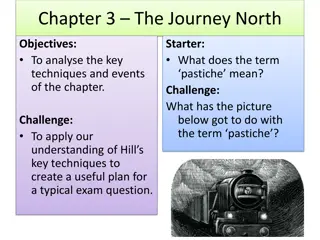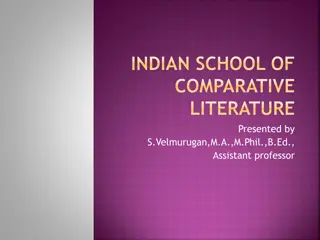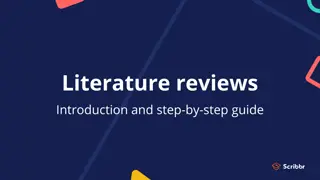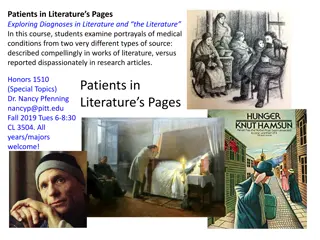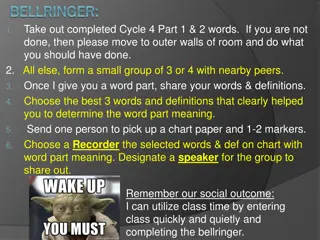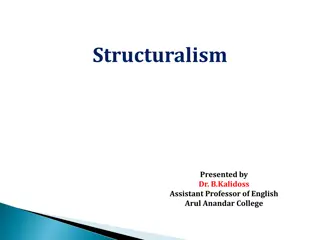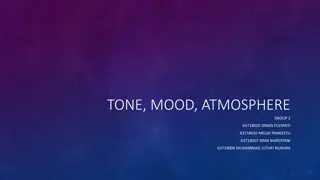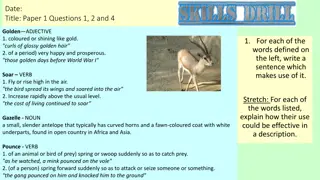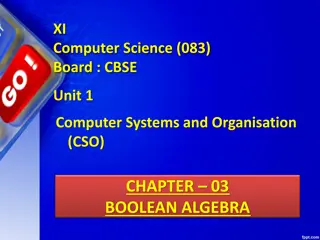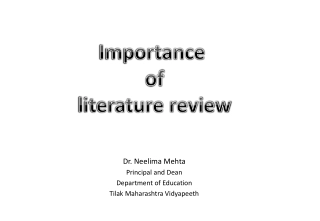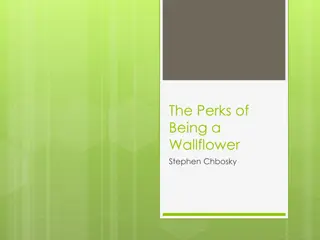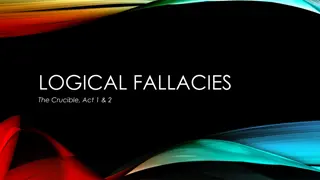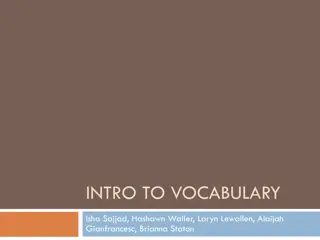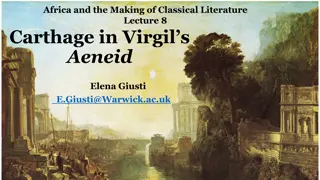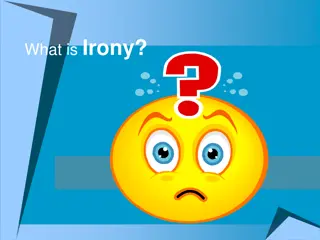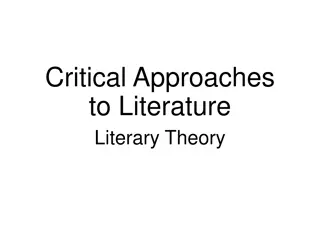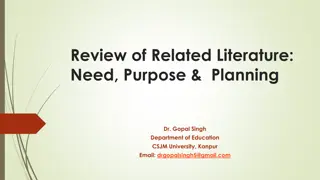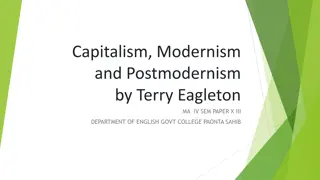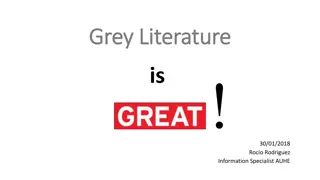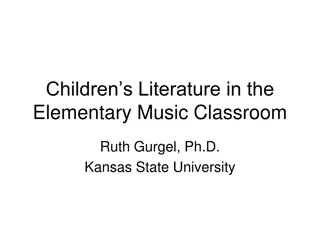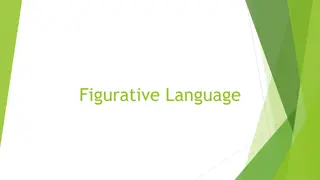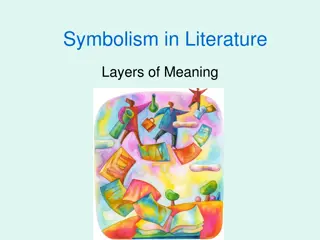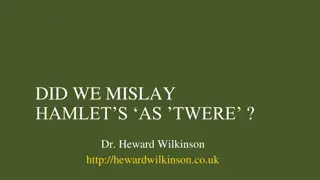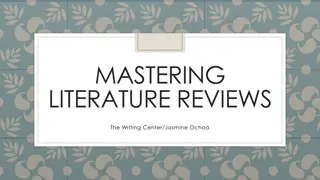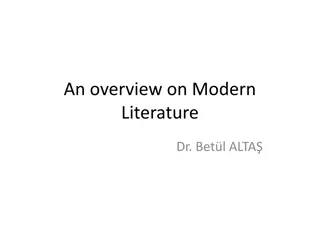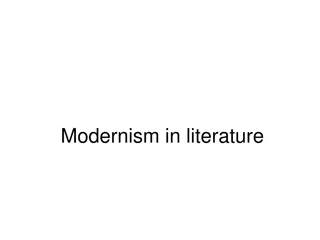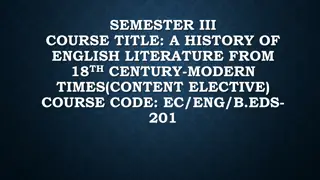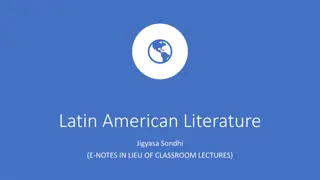Understanding Pathetic Fallacy in Literature: An In-Depth Analysis
Delve into the world of literature as we explore how writers, such as Charles Dickens and Shakespeare, skillfully use pathetic fallacy to create specific moods and atmospheres. Learn about the connotations and effects of weather on storytelling while analyzing key literary works like "Oliver Twist" and "Macbeth." Discover the nuances of this literary device and sharpen your analytical skills in this comprehensive lesson.
Download Presentation

Please find below an Image/Link to download the presentation.
The content on the website is provided AS IS for your information and personal use only. It may not be sold, licensed, or shared on other websites without obtaining consent from the author. Download presentation by click this link. If you encounter any issues during the download, it is possible that the publisher has removed the file from their server.
E N D
Presentation Transcript
Lesson 20 & 21 Oliver Title: Pathetic fallacy Lesson focus - Evidence and analyse in depth and detail writers use of literary, rhetorical and grammatical features on different reader and select from a range of strategies to locate, retrieve and compare information
DNA How do these images and make you feel?
Word Consciousness New word and DD Your definition Synonym Aggravate - make (a problem, injury, or offence) worse or more serious. annoy or exasperate. Bewildered - perplexed and confused; very puzzled. Sombre - having or conveying a feeling of deep seriousness and sadness.
Learning Journey Last lesson we looked at how Dicken s uses pace in writing and wrote our own descriptive writing creating pace. We used our inference and analysis skills Today we will do close reading of extracts to analyse how pathetic fallacy is used in Oliver Twist & in Shakespeare Absorption Text
How can I explain how Dickens uses pathetic fallacy?
What is pathetic fallacy? Where a writer uses the weather to create a specific mood or atmosphere.
Shakespeares Macbeth Absorption Text TDQ s 1. What are the connotations of thunder? What could the mood suggest in this scene? 2. What does blown suggest about the weather? What could you foreshadow? 3. What do you associate with darkness? What could it mean here? 4. Why might Shakespeare have used pathetic fallacy in Macbeth? In Act II, Scene 3 Lennox speaks to Macbeth: The night has been unruly. Where we lay, Our chimneys were blown down and, as they say, Lamentings heard i th air, strange screams of death ....Some say the Earth Was feverous and did shake. Ross talks with an "old man" outside Macbeth's castle in Scene 4. The elderly man remarks that never has he witnessed a night such as this one when "...darkness does the face of earth entomb" In Act 1, Scene 3, there is thunder as the witches appear; then, Macbeth enters the area where the witches are. He remarks, "So foul and fair a day I have not seen"
Contiguous read We will now read chapter 21 & 22 Keep an eye out for any ways that Dickens uses pathetic fallacy.
Cornell Notes Complete the notes summary for Chapters 21 & 22
How can I explain how Dickens uses pathetic fallacy? In Chapter 21, Sikes takes Oliver on a long journey to the town of Shepperton. They arrive after dark. In Chapter 22, Sikes leads Oliver to a house where Toby Crackit and Barney are waiting. Sikes and Crackit set out with Oliver. They arrive at the targeted house and climb over the wall surrounding it. Oliver realises that he will be made to participate in a robbery. He begs Sikes to let him go. Sikes prepares to shoot him, but Crackit knocks the pistol away, saying that gunfire will draw attention. The inhabitants of the house wake up and Oliver is shot by them. Sikes carries him away from the scene.
How can I explain how Dickens uses pathetic fallacy? TASK: CLOSE READING - You will be given three extracts and text dependant questions to answer.
EXTRACT ONE Text dependant questions - Analysis This is before the robbery, opening of Chapter 21 It was a cheerless morning when they got into the street; blowing and raining hard; and the clouds looking dull and stormy. The night had been very wet: large pools of water had collected in the road: and the kennels were overflowing. There was a faint glimmering of the coming day in the sky; but it rather aggravated than relieved the gloom of the scene: the sombre light only serving to pale that which the street lamps afforded, without shedding any warmer or brighter tints upon the wet housetops, and dreary streets. There appeared to be nobody stirring in that quarter of the town; the windows of the houses were all closely shut; and the streets through which they passed, were noiseless and empty. 1. What is the effect of the blowing and raining hard ? What atmosphere does it set? 2. What does the adjective aggravated suggest about the weather? 3. What context can you derive from the sombre light only serving to pale that which the street lamps afforded ? 4. What might dreary suggest about the streets?
EXTRACT TWO Text dependant questions Analysis This is before the robbery near end of Chapter 21 1. Why does Dickens use the intensifier very in the opening line? The night was very dark. A damp mist rose from the river, and the marshy ground about; and spread itself over the dreary fields. It was piercing cold, too; all was gloomy and black. Not a word was spoken; for the driver had grown sleepy; and Sikes was in no mood to lead him into conversation. Oliver sat huddled together, in a corner of the cart; bewildered with alarm and apprehension; and figuring strange objects in the gaunt trees, whose branches waved grimly to and fro, as if in some fantastic joy at the desolation of the scene. 2. What atmosphere is created in this extract? 3. What is the effect of the phrase piercing cold ? What does it help the reader to understand? 4. Why does Dickens use the adjectives gloomy and black ? 5. How does this extract give us a clue that something bad will happen?
EXTRACT THREE Text dependant questions - Analysis This is after the robbery in the first few pages of Chapter 22 1. Why does Dickens switch to the intensifier intensely after the robbery? It was now intensely dark. The fog was much heavier than it had been in the early part of the night; and the atmosphere was so damp, that, although no rain fell, Oliver's hair and eyebrows, within a few minutes after leaving the house, had become stiff with the half- frozen moisture that was floating about. They crossed the bridge, and kept on towards the lights which he had seen before. They were at no great distance off; and, as they walked pretty briskly, they soon arrived at Chertsey. 2. Why do you think he describes the fog as much heavier ? 3. What is the effect of the adjective half-frozen ? 4. What atmosphere/mood is created for the reader through the pathetic fallacy used in this extract?
Demonstrate: How does Dickens use pathetic fallacy in Oliver Twist ? Success Criteria: Clear response to the question asked Use evidence from the text Identify a technique or word to zoom in on Discuss the effect of this on the reader Make links to the context Dickens purposely uses pathetic fallacy to create an atmosphere/mood of


